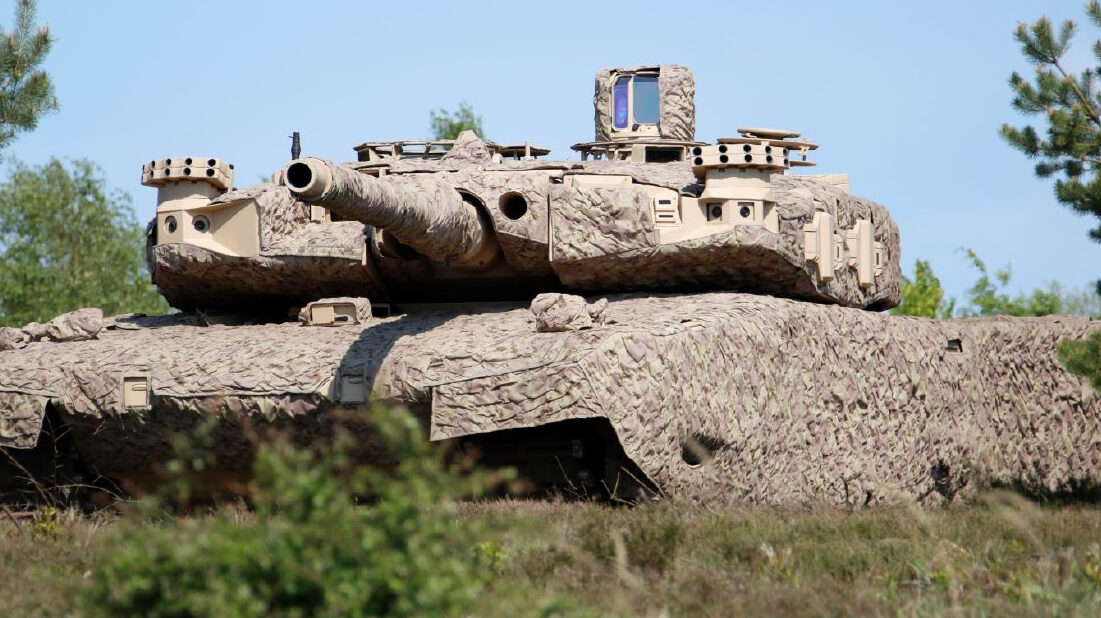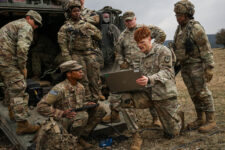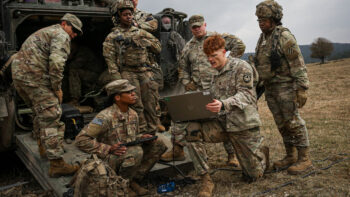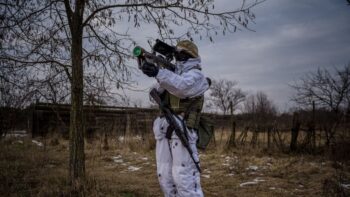
A German Leopard II tank, similair to those headed to Slovakia. (Rheinmetall)
PARIS – The Germans have a specific word for an exchange between at least three parties: “Ringtausch.” So it makes sense that is what the German government has named its procedure to gift modern military equipment to former Soviet-bloc countries who, in turn, gift their Soviet-era equipment to Ukraine.
With this system Germany has hoped to avoid the controversial issue of delivering heavy weapons directly to Ukraine, while still helping Kyiv’s resistance to Russia. In August, Defense Minister Christine Lambrecht stated that “in addition to our direct arms deliveries, Ringtausch proves to be a sensible way to support Ukraine’s struggle for survival quickly and effectively. With the delivery of the Leopard package, Germany stands by its word!”
Since the program was formulated shortly after Russia’s invasion, Germany has moved 109 land vehicles from excess inventory through agreements with Greece, Slovenia, Slovakia, and the Czech Republic. In turn, those countries have shifted some 138 armored vehicles to Ukraine.
The most recent Ringtauch agreement, announced Nov. 16 by German defense company Rheinmetall, will see the armed forces of the Slovak Republic get 15 Leopard 2A4 main battle tanks which are already in the process of being overhauled. Rheinmetall said in a statement the tanks are “the property of Rheinmetall” but were “formerly in the inventories of various user states.” (According to a company spokesperson, those vehicles were bought back after the former owners disbanded parts of their armed forces in the post- Cold War era.)
Slovakia will also get ammunition and logistical support for the tanks, as well as a training package.
The first vehicle is scheduled to be shipped in December and the remaining 14 will all have been delivered by the end of 2023. In exchange, Slovakia will hand over 30 Soviet-era BVP-1infantry fighting vehicles to Ukraine which, given the Ukrainian troops experience with this type of equipment, they will be able to use immediately.
The previous Ringtausch agreements include:
Greece: The Greeks became the first Ringtausch partner, after months of negotiations. Athens will get a total of 40 Marder tracked infantry fighting vehicles from Germany, 20 of which have already been delivered and are already positioned at Evros on the Greco-Turkish border. “That is where the Armed Forces deem them to be most useful,” Prime Minister Kyriakos Mitsotakis said at a joint press conference with Chancellor Olaf Scholz in Athens in October.
In return Greece is sending 40 BMP-1 tanks to Ukraine. Greek President Katerina Sakellaropoulou met with her Ukrainian counterpart Volodymyr Zelensky on Nov. 3 who thanked her for the first batch of BMP-1 tanks that have arrived.
Czech Republic: The Czechs will receive 14 Leopard 2 A4 battle tanks and a Büffel armored recovery vehicle. In exchange it will deliver about 40 Soviet-era T72 tanks to Ukraine; the first of the German tanks is scheduled for delivery before the end of the year. Prague has already gifted weapons and ammunition worth more than €50m to Ukraine since Feb. 24 when Russian troops invaded Ukraine.
The Büffel (Buffalo) was developed by Rheinmetall based on the Leopard 2 chassis and fitted with a crane, winch and front-mounted dozer. Its main mission is recovery of damaged, overturned and swamped main battle tanks and other tracked vehicles. It can also undertake general dozing and remove obstacles. It should not be confused with the Buffel infantry mobility vehicle used by the South African Defence Force in the 1980s, the first effective landmine-protected armored personnel carrier to enter service anywhere in the world.
Slovenia: In late September Lambrecht and her Slovenian counterpart Marjan Šarec signed a letter of intent, according to which Slovenia would supply 28 upgraded M-55S main battle tanks to Ukraine and in return will get 40 MAN KAT-1 15-ton military trucks and five water tankers. According to Slovenian media 24ur.com, quoting the country’s Ministry of Defense, the M-55S tanks, which were in the Slovenian Army reserves, have been “successfully handed over to Ukraine” after traveling by train through Poland. The upgraded M-55S is the first tank upgraded to NATO standards in Slovenia. Ljubljana should receive that first of its 15-ton trucks before the end of the year.
It’s not all success with the Ringtausch effort, however. Warsaw, which has already delivered some 200 tanks to Ukraine, apparently was “dissatisfied” with the German offers and backed out of a potential deal.
Is Ringtausch Working?
Deutsche Welle (DW), Germany’s international broadcaster, recently interviewed government officials of the participating countries and independent experts to find out how Ringtausch was perceived, which included a discussion on why the Poland agreement fell apart.
Justyna Gotkowska, deputy director of the Warsaw Center for Eastern Studies and an expert in Germany’s security and defense policy, told DW that Poland wanted at least 44 modern tanks whereas Germany was offering only 20 old generation ones. She confirmed her remarks in an email to Breaking Defense. “The Polish army is in an accelerated modernization phase and sees no point in investing in old equipment,” she said, adding that “Germany has faded into the background as a partner for military-technical cooperation in the field of tanks.”
Poland is buying not only 250 M1A2 System Enhancement Program version 3 Abrams tanks from the United States but also 1,000 South Korean K2 Black Panther tanks, all modern weaponry compared to the older options being presented by Germany.
Gotkowska also remarked that “Berlin’s policy of military support for Ukraine is judged in Warsaw as far from sufficient in relation to German possibilities.”
Hans-Peter Bartels, a German SPD politician and president of the Society for Security Policy, seemed to agree, telling DW he does not believe Ringtausch will really help Ukraine much, because Western weapons are much more effective than old Soviet ones being sent to Kyiv.
In contrast, Ringtausch was welcomed by the Czech Republic and Slovakia. It is “generally regarded as positive and beneficial” Czech political scientist Jiří Pehe told DW.
Slovakian political scientist Grigorij Mesežnikov told Breaking Defense in an email that “the approach chosen by Germany and Slovakia in delivering military equipment to Ukraine can help not only Ukraine but also Slovakia. Frankly, I am a supporter of the idea of directly supplying Ukraine with modern, advanced and efficient Western arms, but if the circumstances require quicker delivering of arms which are quite well known for Ukrainian military, experienced with handling the Soviet systems, then it is better than to wait until Ukrainians are well-trained in handling Western weapons.”
Mesežnikov added that Defense Minister Jaroslav has several times “expressed opinion that thanks to the [Ringtausch], the Slovak army can get modern Western weapons.”
Antonis Kamaras, defense expert at the Athens foreign policy thinktank ELIAMEP, told Breaking Defense in an email that he believes the port of Alexandroupoli in the Aegean Sea, and close to the Bulgarian border, which is being used to transfer weapons systems, supplies and ammunition to Ukraine is a much greater contribution than supplying tanks to Ukraine.
“While it is not publicly disclosed what exactly is transported from the port of Alexandroupoli, informal official briefings in the Greek press give the impression that the port is important to Ukraine’s war effort. My hunch is thus that the port’s role is more important than the USSR-vintage infantry fighting vehicles that Ukraine has been getting from Greece via the Ringtausch program,” he wrote.
Kamaras added that “in terms of Greece’s motives it is really simple: in the event of a Greek-Turkish war, Greece would like from its European partners exactly what Ukraine is getting: plentiful munitions, weapons systems and ISR support. So both through the use of Alexandroupolis and the transfer of the IFVs, Greece is partaking in the setting of a precedent of European solidarity which can potentially enhance its own deterrence vis-à-vis Turkey down the road.”
Sullivan says Ukraine supplemental should cover all of 2024, long-range ATACMS now in Ukraine
“We now have a significant number of ATACMS coming off their production line and entering US stocks,” Jake Sullivan said today. “And as a result, we can move forward with providing the ATACMS while also sustaining the readiness of the US armed forces.”


























